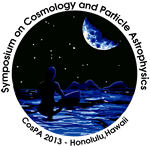Speaker
Dr
Francis-Yan Cyr-Racine
(Jet Propulsion Laboratory/Caltech)
Description
If all or a fraction of the dark matter (DM) were coupled to a bath of dark radiation (DR) in the early Universe we expect the combined DM-DR system to give rise to acoustic oscillations of the dark matter until it decouples from the dark radiation. Much like the standard baryon acoustic oscillations, these dark acoustic oscillations (DAO) imprint a characteristic scale, the sound horizon of dark matter, on the matter power spectrum. We compute in detail how the microphysics of the DM-DR interaction affects the clustering of matter in the Universe and show that the DAO physics also gives rise to unique signatures in the temperature and polarization spectra of the cosmic microwave background (CMB). We use cosmological data from the CMB, baryon acoustic oscillations (BAO), and large-scale structure to constrain the possible fraction of interacting DM as well as the strength of its interaction with DR. Although our results can be straightforwardly applied to a broad class of models that couple dark matter particles to various light relativistic species, in order to make quantitative predictions, we model the interacting component as dark atoms coupled to a bath of dark photons. We find that linear cosmological data and CMB lensing put strong constraints on existence of DAO features in the CMB and the large-scale structure of the Universe. Interestingly, we find that at most ~3.5% of all DM can be very strongly interacting with DR. We show that our results are surprisingly constraining for the recently proposed Double-disk DM model, a novel example of how large-scale precision cosmological data can be used to constrain galactic physics and sub-galactic structure.
Author
Dr
Francis-Yan Cyr-Racine
(Jet Propulsion Laboratory/Caltech)
Co-authors
Dr
Alvise Raccanelli
(Jet Propulsion Laboratory/Caltech)
Prof.
Kris Sigurdson
(University of British Columbia)
Dr
Roland de Putter
(Jet Propulsion Laboratory/Caltech)

